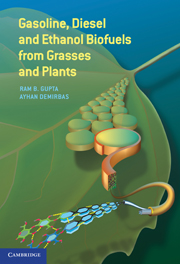Book contents
- Frontmatter
- Contents
- Preface
- 1 Introduction
- 2 Air Pollution and Global Warming from the Use of Fossil Fuels
- 3 Renewable Energy Sources
- 4 Biomass Availability in the World
- 5 Conventional Ethanol Production from Corn and Sugarcane
- 6 Ethanol from Biomass by Fermentation
- 7 Biodiesel from Vegetable Oils
- 8 Diesel from Biomass Gasification Followed by Fischer–Tropsch Synthesis
- 9 Bio-Oil from Biomass Pyrolysis
- 10 Biocrude from Biomass Hydrothermal Liquefaction
- 11 Solar and Wind Energy for Biofuel Production
- 12 Environmental Impacts of Biofuels
- 13 Economic Impact of Biofuels
- 14 Biofuel Policy
- References
- Index
13 - Economic Impact of Biofuels
Published online by Cambridge University Press: 05 June 2012
- Frontmatter
- Contents
- Preface
- 1 Introduction
- 2 Air Pollution and Global Warming from the Use of Fossil Fuels
- 3 Renewable Energy Sources
- 4 Biomass Availability in the World
- 5 Conventional Ethanol Production from Corn and Sugarcane
- 6 Ethanol from Biomass by Fermentation
- 7 Biodiesel from Vegetable Oils
- 8 Diesel from Biomass Gasification Followed by Fischer–Tropsch Synthesis
- 9 Bio-Oil from Biomass Pyrolysis
- 10 Biocrude from Biomass Hydrothermal Liquefaction
- 11 Solar and Wind Energy for Biofuel Production
- 12 Environmental Impacts of Biofuels
- 13 Economic Impact of Biofuels
- 14 Biofuel Policy
- References
- Index
Summary
Biofuel Economy
High petroleum prices, increasing trade deficits due to fuel import, depleting petroleum supplies, and increased concern over the greenhouse gas emissions from fossil fuels have driven interest in transportation biofuels (Hill et al., 2006). For many developing countries, petroleum import accounts for the major share of their outflow of foreign exchange, putting a high strain on the growth. For such countries, a locally produced fuel can help with the economy. The first-generation biofuels (ethanol and biodiesel) are already in the market, and the second-generation biofuels from biomass are emerging. The U.S. Energy Independence and Security Act of 2007 provides major support for the biofuel industry by setting a renewable fuel requirement for use of 36 billion gallons per year of biofuel by 2022, with corn ethanol limited to 15 billion gallons. Any other ethanol or biodiesel may be used to fulfill the balance of the mandate, but the balance must include 16 billion gallons per year of cellulosic ethanol by 2022 and 5 billion gallons per year of biodiesel by 2012.
With increasing global interest in biofuels, there is a considerable discussion on the biomass supply and conversion costs. Production and use of life cycle analysis are being carried out to determine whether biofuels provide any benefit over fossil fuels, accounting for various aspects such as farm yields, commodity and fuel prices, farm energy and agrichemical inputs, production plant efficiencies, coproducts, greenhouse gas emissions, and so on.
- Type
- Chapter
- Information
- Gasoline, Diesel, and Ethanol Biofuels from Grasses and Plants , pp. 191 - 199Publisher: Cambridge University PressPrint publication year: 2010
- 1
- Cited by



